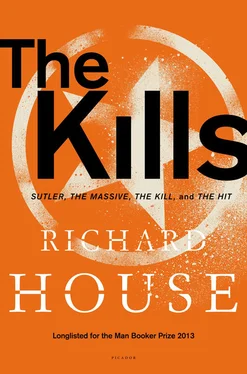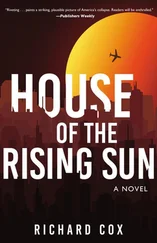Lexi has trouble giving directions to the hotel. The Miramar is the hotel the Russians use. They party there. They chase the prissy British tourists out. They shock the Scandinavians with their appetites and disregard to civil decency. They misbehave. Mattaus is housed there, licking wounds after a family misunderstanding. Mattaus has no idea how bad his night is about to become. Lexi has an inkling.
Tomas parks in front of the hotel and coaches Lexi in what he will do. He goes through the lobby, he takes the lift. He waits outside the lift for Tomas. He does not go to the room until Tomas arrives. Lexi seems to have it straight. Appears to be composed. It isn’t complicated.
Lexi produces a card key from his wallet.
Tomas takes the card key, and tells Lexi he’ll meet him outside the elevator on the seventh floor. He doesn’t intend to leave Lexi out of his sight for very long, but he doesn’t want to be seen entering the hotel.
* * *
Tomas comes into the hotel from the pool, finds the stairs and makes his way to the seventh floor without any kind of challenge. Even so, he arrives before Lexi. When the lift doors open Lexi looks different, as if he’s used to this level of threat, acclimatized now, dulled. The man complains that he’s dizzy. Feels a little sick. He’s distracted with it and doesn’t want to focus, drifts when Tomas draws his attention to the room.
The room is empty. Mattaus is nowhere: the bed is still made, undisturbed. There’s no sign that the room has been used.
Tomas sits Lexi on the bed. ‘Where is he? You said he would be here.’
Lexi swears he has no idea, shakes his head. The man speaks to himself in Russian.
Tomas holds Lexi’s head between both hands. ‘Where is Mattaus Falsen?’
Lexi complains that his head hurts, he needs fresh air. He asks Tomas to open the door. He needs air.
‘Where is he?’ Tomas shakes Lexi, tries to make him focus. ‘Is he in this hotel?’
Lexi nods and then shakes his head. The man won’t look him in the eye.
Tomas asks him what he’s done.
Tomas goes to the balcony and opens up the curtain, the door and the screen.
‘What have you done?’
He feels some admiration now. Lexi is fighting back in some small way.
‘Is someone coming?’
Lexi complains that he can’t breathe.
‘Why did it take you so long to get to the room?’
Lexi doesn’t answer.
‘He doesn’t use this room, does he?’
Lexi softly nods.
‘And have you called him and warned him?’
Again, Lexi nods.
‘Do you know where he is at all?’
Lexi mutters a reply. Tomas asks him to repeat himself.
‘I told him to go. I don’t know where he will be.’
Tomas beckons Lexi forward and asks again what he has done.
Lexi looks partly over his shoulder at the open balcony door. The pool.
‘You’re not leaving this room,’ Tomas whispers in his ear, the tone is final, and Lexi’s face sets back in the same expression he’d had when he’d first set eyes on Tomas.
Pushed or jumped, it doesn’t matter. Lexi falls without noise. No shouting. Face out, perhaps in hope. Pitched forward. Arms wheeling. A long way from the pool. The impact is a compact sound, final enough to be only exactly what it is. A body hitting concrete. It doesn’t bring the chaos Tomas expected. And he thinks that this wrong, that such an incident should bring no attention seems a little obscene.
If Mattaus is on the run, Tomas admits that he’d probably not find him.
He takes out Mattaus’s phone. Carefully wipes it, then drops it onto the floor. He nudges it under the bed, just far enough. This now, is far from the shape and dimension he had determined.
* * *
He sits in the car, watches the police arrive, the ambulance. Satisfied with what he’s done with the phone (an uncannily smart idea), he asks himself if this could have played out any differently. Although Lexi misunderstood who Tomas was, he read the situation, understood the result, and Tomas wonders if this couldn’t have been different, and how Mattaus will hear about this. The news, the discovery of his telephone, will make a world of trouble for him — which should certainly make him run.
Today, he remembers, he has arranged to go swimming. Tomas and Rike are taking a picnic to Lady’s Mile.
11.6
They meet on the sea front. Rike has a backpack with a swimming costume, a swimming cap, and a towel. She’s ready for everything, she says. Tomas is in his hire car which stinks now of carpet cleaner. He unwinds the windows because the smell bothers him, already his throat feels thick and the heat threatens a headache. Like he isn’t tired enough anyway. The bay’s long swoop can be seen from the front. You can literally see where you’re going. He points this out to Rike as she ducks into the car. Something about her, as always, comes across as fresh and welcoming, if a little pathetic. Rike lumbers the backpack onto the back seat and explains she’s packed a towel and the costume, of course, but also some treats, out of habit, ginger beer, and mentioning it she turns a little red, her cheeks gain colour — because this is childish, or it’s something she did when she was a child? He can’t decide. She has suntan lotion, factor 50 if they need it, although how strong is the sun anyway at this time of year? She has rum in a small bottle. She has wipes. She has insect repellent, although, apart from wasps, there really isn’t much to worry about. She didn’t tell her sister, she explains, just said she was going on her own to the beach at Amathus. She’d only have ideas if she knew, and Isa’s humour can be fierce. She doesn’t know, really, how aggressive she appears to other people sometimes.
They were here the other day, but on the other side of the perimeter, so to speak, on the British base, and one man had caught an octopus, told them also there were moray eels, a ray of some kind. The man’s face had shone as he described the sighting, one week before. A ray with a wingspan of say, one metre, one and a half, mottled brown and black, and white underneath. It moved, the man said, only the tips of its wings. Funny word that, giving a creature wings under water.
There were also pottery shards to collect, and he’d brought them up. Pieces of amphora, most of them pinkish and curved and softened by their time underwater, some encrusted with white snail-like trails. A few pieces displayed how antique they were, the mouths of the jars, the double handles. Ships taken in storms? Perhaps even run aground. The island ends in a stub, and from that stub runs a sharp shelf, so that the sea bed drops from two metres to seven.
They drive out of Limassol, by the castle keep at Kolossi, the air a kind of blanket, folds of heat. After the castle, the refugee camp, bunkers in long rows, then suddenly lines of trees, behind them citrus orchards. Rike closes her eyes, and Tomas watches, and wonders if anyone has ever been so relaxed about him. If this was so he couldn’t remember. Rike holds her arm out to the breeze and suggests that they stop. When they came by here the other day they’d passed a shop, all on its own, which sold fruit and souvenirs. There were baskets out front, hanging from the awning, and she’d liked the look of it but they hadn’t time to stop.
At the next crossroads they come to the store.
The line of trees remind him of New Hampshire — it’s a little unguarded he realizes to give an actual location. Remote, you know, completely out in the woods, and he was cycling along a path and felt something above him, a bird, right at the tree tops overtaking then flying just ahead, broad wing span, bigger than his outstretched arms. This bird, this hawk or something — are hawks even that large? — but there at some height, ahead, following the same path.
Читать дальше












